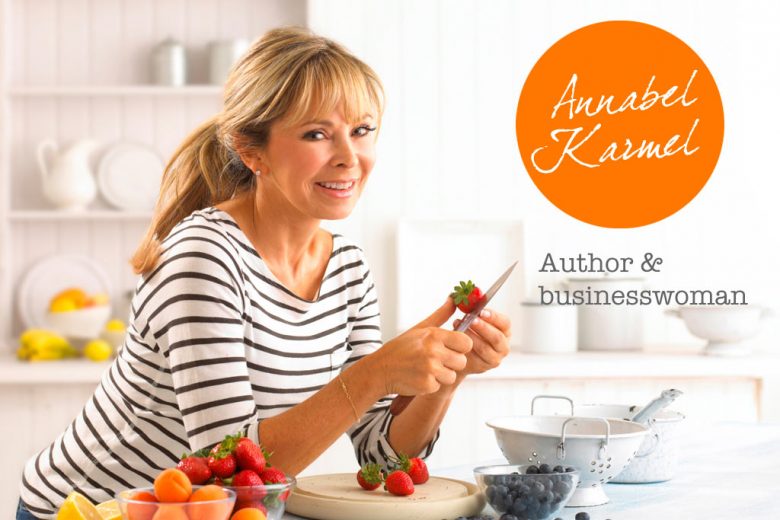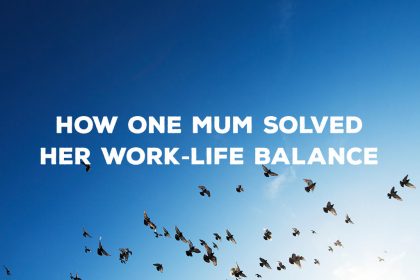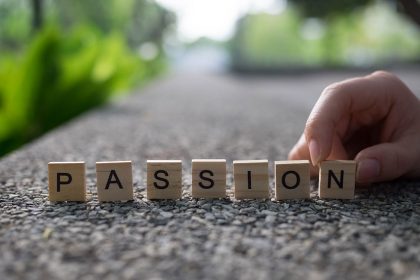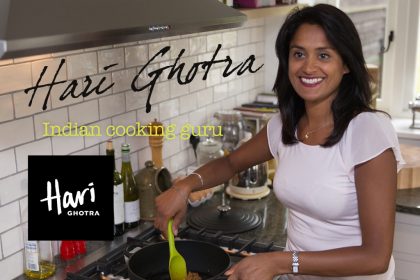Author and businesswoman Annabel Karmel
There can barely be a mum in the UK who hasn’t heard of Annabel Karmel. Her recipes have fed millions of babies, and helped frustrated mums make and buy healthy, tasty food for fussy young children.
We interviewed Annabel to find out what inspired her to write her first recipe book, how she has changed the baby food market, and why she feels so passionately about helping other ambitious business mums.
What inspired you to write your first book?
I wanted to find a way to make sense of my daughter Natasha’s life after she died.
Before I started my family I was a musician, and had spent most of my life playing the harp and singing. I went to the Royal College of Music and was doing well with a serious classical career. Then I got married. I had always wanted a child, but it took me over two years to get pregnant. So I was over the moon to give birth to a little girl we named Natasha.
However, one day when she was about 12 weeks old, I went into her room and she didn’t look right. I called my doctor but he said that he was sure he was fine, and I was just worrying because I was a first time mother. I insisted on taking her in to see him, but again he fobbed me off, saying that she was fine.
The next day I got up early and took her to see another doctor. He examined at her and then went out of the room, saying he needed to see another patient. But when he returned, he told me that he had in fact been trying to get Natasha a bed at Great Ormond Street Hospital as there was something seriously wrong with her brain.
He said I should take her straight away to the nearest hospital but she started to fit and they had to give her drugs. She was in the hospital all day, but nobody told us anything. Then we were called into a room and told that she’d never be normal again and may die. Natasha was then finally transferred to Great Ormond Street Hospital, where she died in my arms five days later.
Losing Natasha was the most horrific thing, and it changed my entire life. I couldn’t go back and play music as it seemed a superficial thing to do, and I knew then that I wanted to find a way to make some sense of her life. When you lose a child it’s very difficult to come to terms with it, and I wanted to do something that would help other children.
What made you choose a cookbook for babies?
Cooking has always been my hobby. Then, about a year after Natasha died I had a son, Nicholas. He was not an easy child – he was an extremely bad sleeper and eater, and I felt very vulnerable with a child who didn’t eat, so I started experimenting with different foods to find something he liked.
I spent a lot of time in the kitchen developing recipes for Nicholas. And at the same time I was running a large playgroup with mums with children about his age, and I was giving out my recipes to the other mums who were also having problems getting their children to eat. I realised then that eating problems with babies and young children are widespread.
All the baby recipe books available at the time were bland, and my friends said that I should write my own. But I brushed them off, thinking that I didn’t know how to write a book. After a while though, I thought a cookbook to help other children would be a great legacy to Natasha.
How did you write your first book?
I spent two years writing the book. I spoke to experts on child nutrition and spent days and days testing my recipes on children. Then I approached publishers. However, nobody wanted my book because baby food books weren’t commercial at that time.
So eventually I got it published with a book packager and Random House bought it. That book, The Complete Baby and Toddler Meal Planner, was first published in 1991. It sold out within three months, and went on to sell 4 million copies. Today it’s the second bestselling non-fiction hardback book of all time.
Did the success of the book surprise you?
I never thought The Complete Baby and Toddler Meal Planner would be mega successful because if I chose a book that would be a bestseller, the last subject I would have chosen was baby food! Until that time, no books on baby food sold well.
But I did believe wholeheartedly in my book. It was very hard to get started, and if I hadn’t been as determined as I was I think I would have given up, because I got rejected by about 20 publishers.
I actually got very bad royalties from the book, which is a shame as it was a bestseller! But it got me my first deal, and I have gone on to write 38 books over the course of my career so far.
What was the baby food market like before you entered it, and how much has it changed now?
My first book changed the way babies are fed. Before I wrote it, everybody said that babies liked bland food. But I thought that was odd – I don’t like bland food, so why should babies?
So my recipes were not bland. I’d find ways to make them taste good. I’d test babies out on something bland like pureed potato, and something with flavour, like peas, lamb and mint, and found that they liked the tasty food.
When I wrote my book I worked with the Institute of Child Health (the research arm of Great Ormond Street Hospital) so everything is scientifically proven. I realised that some of the things being told to mums at the time – like you shouldn’t give eggs or meat to babies until they were one year old – were wrong. And in fact, some of these foods are really important from six months.
Today baby food has changed from being very bland to things like Moroccan chicken and foods and flavours from around the world – and I did that. I also invented the idea of freezing food in ice cube trays.
You’ve built your business while raising three children – how did you do it?
I thought about what career to have with children, and decided that writing was a very good choice as you can do it in your own time, and be with your children when you need to be.
I wrote my first book when my children were asleep or resting. I was also cooking a huge amount of food for them, and my friends were all having babies so I was around children all the time. It just made sense and fitted in with my life very well.
Why is it important for you to help other mums?
There’s a lot of pressure on mothers to do everything right. But some mothers have never even held a baby before! People seem to think instinctively you know what to do, but you don’t.
Being a mother is the most important role in a woman’s life, and one you have no training for. So in my books I try to hold the mum’s hand and get her through the difficult times of feeding her child.
Why have you decided to write a new business book for mums?
I think many women have an idea of what they want to do, but lack the confidence to do it. And I did in a way, but I’m a very determined person and I decided, when every publisher was turning me down, that it was the right thing to do so I carried on.
I feel that if you’re going to be a good mother you need to be fulfilled, so I want to help other women in my position to find a new career, and inspire them to have the confidence to start their own business, if that’s what they want to do.
It’s been one of the most interesting books I’ve ever written. I have been interviewing successful business women with kids – like Chrissie Rucker from The White Company and Thea Green from Nails Inc – to find out how they did it. Meeting all these people has been an education in itself, and they have all been very driven.
Often we think we need to be an expert to start a business, but you don’t – you learn on the job. I wasn’t an expert on baby food when I started, but I became an expert when I wrote my first book. A lot of it is just about confidence and drive.
The book will be published in spring 2015. It’s very inspirational, and also a useful ‘how to’ book for women who aren’t necessarily really content with what they’re doing – women who love their children and want to be a good mum, but also want something else in their life.
Why do you think it’s so hard for mums to resume their careers?
Some people are very happy being at home with their child and not doing anything else, and some people would be a horrible mother if that’s all they did – they would become so unhappy with themselves because they need a more independent life.
I know because I am one of those people. Although I wanted to spend a huge amount of time with my children, and I did – I spent most of my time with them when they were young and I was writing – I also needed a career.
Having said that, returning to work isn’t always easy. Women look at their career and think they can’t go back to what they were doing, and stay at work until 8:00pm, because they wouldn’t see their children.
The cost of childcare today is also prohibitive, and in a traditional job you’re paying out a huge chunk of what you’re earning on childcare.
To be able to be with your child and have a career is ultimately what a lot of women want – not every woman certainly, but a lot. So I think it’s natural for many women to want to start their own business, and it’s no surprise to me that a recent survey has revealed that 65% of mums consider starting a business from home.
If you were starting out again, what would you do differently?
I wish I’d had the confidence to go into food manufacturing earlier, but I felt there were giants in the business and it took me a long time to believe that I could do it better.
Many years ago I wanted to do frozen baby food, but there was no electricity in the baby food aisles so I realised that wasn’t possible. Then I looked at the pouches and jars but thought they tasted terrible and assumed you couldn’t make food taste good.
It was actually one of my spectacular failures that got me into manufacturing my own baby food. I decided to do fresh baby food, and put it in the chilled aisle. It tasted fantastic, but even though the sales were good, the wastage was so high it wasn’t commercially viable.
So I put my fresh food through a process called ‘retort’ which gives it a longer shelf life, and it still tasted really like good – like homemade food, and much better than the other savoury baby food on sale.
My principle has always been that if I believed I could do something differently and add quality, I would do it. So I finally launched my own baby food range at the end of last year, 23 years after the sale of my first book. I kick myself now for not doing it back in the 1990s – I had all the recipes but I didn’t trust myself to do it.
Why do you think that your food is so much better?
Annabel Karmel is my brand. There’s only me and I am only as good as my last meal, or the last meal somebody makes from one of my books.
Being a small brand you’re going to take much more care over your recipes and food. And it’s not easy to make baby food taste great. You can’t add salt, which adds flavour, so you need to be more imaginative and persist in finding a way to make a dish work.
However, in most large companies there isn’t someone who loves what they do and cares about it enough to go to the nth degree of making sure it tastes absolutely right. They’ll develop a rice meal, and once it’s okay they’ll develop two or three dishes based on it and then move onto the next thing. Up until now, we’ve just come to accept that baby food doesn’t taste that great.
Larger companies also avoid expensive ingredients. A lot of companies don’t do fish, for example, because it costs too much. But I know there aren’t enough purees out there with essential omega 3s, which are important for babies’ brains, so I developed a salmon recipe. I price it the same as my other purees, even though we don’t make much of a mark up on it.
And I think that’s the key difference – caring about what you do, more than just making money.
What has been the hardest aspect of being a working mum?
The guilt. Sometimes when you’re at work, you feel bad because you’re not with your child. Then when you’re spending time with your child, you feel guilty because you’re not working!
But guilt is quite negative, and you should get on with what you need to do – and then go back and have quality time with your child. It’s important to try not to feel guilt because you can still be a good mum and work. But that said, it’s hard and I think we all do feel it.
However, most of us are good mothers and we know our priorities. If there was anything wrong with my child, I’d be the first person to leave the office immediately, and I wouldn’t care what was going on. My children are still my priority over my work and my inspiration. If it wasn’t for them I wouldn’t have my career.
And the most rewarding?
Feeling fulfilled and doing something rewarding with my life. My MBE from the Queen came out of the blue, and it meant a lot that it was for the very thing I wanted to do – to make a difference to peoples’ lives and be there as a mum.
I am lucky in that I have been able to combine my work and being there for my children, and was able to go to every single play group when they were younger. Now I have confidence in myself because I have earned respect for what I have done, and I really feel that I have achieved something.
What has driven you to achieve your level of success?
I would never have written any books had I not had Natasha, and had Natasha not died, and if my second child wasn’t such a terrible eater. So it was my experience in life that drove me to do what I do.
I am also a perfectionist. I will test a recipe 10, 15, 20 times to get it right. I won’t put anything in the book unless I absolutely love it. I also value my career because I am really helping people.
What more would you like to achieve in your career?
I think the more you achieve, the more you want to achieve. I’ve just started out in manufacturing baby food, and I’d like to create the best baby food and raise the bar.
I think the taste of most baby food out there is dire. It doesn’t taste like real food, but we’ve just come to accept it because they’re all as bad as each other, and we have assumed that was just how it is.
I hope that now I’ve come in with a range of baby food that tastes homemade will change the industry. I’d like to see some fresh food in the baby aisle, too.
I’m also interested in going into export. We’ve just gone into the Middle East as they have such a big diabetes problem there, and I thought I could offer something different. The rate of sale of our products there has been very good, and now I want to move into other countries like South Korea, China and Hong Kong.
I’m also involved in school meals. More than 3,000 small schools across the UK and around 15% of primary schools are currently unable to prepare food on site which is a major concerning given the positive benefits a hot, healthy meal has on a child’s wellbeing and classroom performance.
That’s why I’ve been working with the government-backed Small Schools Taskforce to develop a ground-breaking plan to ensure that all small schools have the right food and resources to be able to offer a viable school meals service.
My role has been to develop delicious, healthy recipes on a budget, and initial results from the pilot scheme are showing that schools are already enjoying the benefits of being able to serve up healthy, tasty food at a low cost.
What advice do you have for mums who want to start their own business?
There’s so much I could say! Here’s a few things that come to mind:
- Do your research – if you’re going into a sector, know what your point of difference is, and why what you’re doing is better. You can’t think you can charge a lot more, even if you have a better product because everything is price sensitive right now.
- Find out the retail value – if you want to produce something, don’t ask a manufacturer how much it costs to make it. Ask a buyer how much they can sell it for, then tell the manufacturer that they need to make it for X price, and ask whether they can do it. If they can’t, you haven’t got a business.
- Ask the right questions – when you tell people about your idea, don’t ask ‘What do you think?’, instead ask, ‘Why do you think it might fail?’ and then you might learn something.
- Just get started – you need to start at some point, you can’t keep on prevaricating. I would just put my foot in the water and start – even if you begin by selling to friends. Only by starting will you really understand what your problems are and what your strengths are.
- Don’t try to accurately predict sales – you can think about things and do forecasts, but the only thing you can really know is how much it’s going to cost you to make. You’re never going to know how many you’re going to sell.
- Delegate when you need to – you can’t be master of everything, and there are some things you’ll need to delegate.
- Commit to your business – you have to realise that you can’t do your business part time and still work – it’s impossible. You can’t start a successful business in a half-hearted way.
- Work in your industry – if you do need to work, try to get a job in the industry you want to move into. For example, if you want to manufacture food, try to get into supermarket buying – it’s a fantastic way to learn what sells and what doesn’t, and why.
You can find out more about Annabel Karmel and her products on her website.










